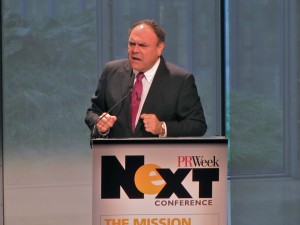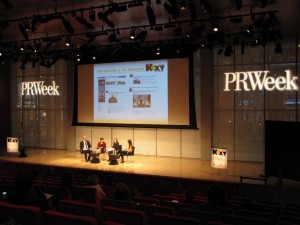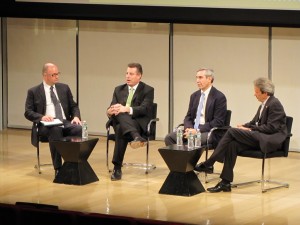I headed back to PR Week’s NeXT Conference at The Times Center on Wednesday, and managed to catch most of Gil Schwartz’s keynote presentation in which he ran through a litany of supposed “PR problems.” You may know Schwartz by his Fortune magazine nom de plume, Stanley Bing. In his Clark Kent day job, Schwartz serves as CBS Corp’s long-time communications chief.
 |
| CBS Comms Chief Gil Schwartz (aka Stanley Bing) |
As part of his talk, Schwartz cited Bank of America’s ill-conceived $5 debit card surcharge, NetFlix’s fatal decision to intro then kill Quikster, BP’s Tony Heyward’s thoughtless sound bites, and Herman Cain’s alleged personal transgressions.
He made an important distinction by insisting that “these aren’t “PR problems.” They are at their core behavioral, decision-making or operational problems, which good PR can help to resolve. Here’s an audio clip (RT: 14:57) of most of his keynote. Schwartz also has this to say:
“One of our specialities is our ability to have nightmares. If you do that, this will happen. It is that attempt to make the organization ‘do the right thing’ that’s at the heart of great public relations, which actually ends up producing no public relations at all…no stories. I have the Hippocratic Oath of PR on my wall, first: ‘Make No News.'”
Following his presentation, someone in the audience asked him about his outing as Fortune’s Stanley Bing. Here’s his recount (RT: 3:25) in which The Times‘s Randall Rothenberg (now IAB chief) let it slip to his intrepid NY colleague (now in DC) Mark Landler.
I did manage to catch up with Gil as he was about to leave The Times Center and was able to get him to elaborate a bit more about his approach to cmmunications and the changes he (we) have seen in the approach we take to quell supposed “PR problems.” I asked about his feeling that apologies do not work and that perhaps it’s better to “starve a story of oxygen,” i.e., respond once (in The Times perhaps), but leave it at that. Here’s the audio clip of the exchange (RT: 5:55).
 |
| New Roots of Authenticity Panel |
Later in the day, I sat through the conversation with Elizabeth Lee, group head, Edelman Digital, Sarah Colamarino, VP, corporate communication, Johnson & Johnson, Christine Cea, director of brand PR, Unilever about “the new roots of authenticity.”
It was an excellent discussion with some neat case studies for the Axe, Dove, Suave brands among others. I especially liked Ms. Colamarino of J&J’s summation of the new communications palette, which we’re all striving to understand, let alone fill:
“It used to be a 30-second TV spot and a public relations campaign. Today, there is so much white space between the two to fill.”
Finally, I attended the last session of the day in which PR Week editor Steve Barrett gathered leaders from Ketchum, Edelman and Golin-Harris to wax on the state of the industry. In this audio clip (RT: 28 mins), we hear from Rob Flaherty, Richard Edelman and Fred Cook.
 |
| Barrett, Flaherty, Edelman, Cook |
First, it was clear that the agency business — especially large global agencies like these — are flourishing in the new communications world order. Second, in spite of many declaring the death of the meme of “who owns this new communications world order: PR or advertising? — the debate rages on.
The energetic and always quotable Richard Edelman suggested that PR firms are best-served when “aligned with the Chief Communications Officer.” He mentioned IBM’s John Iwata and the Smarter Planet campaign in which all the different communications disciplines come into play such as branding, reputation, public affairs…
“On the corporate public affairs side, I think we have to say that our opposition is not other firms nor is it McKinsey. It’s actually the Chief Legal Counsel. I think we need to go at that guy’s jugular. The reason is: it’s a complete control function. It’s totally wrong in today’s society…they’re thinking 1980, we’re thinking today. …I think we have to say: advertising, lawyers…enemies.”
On the question of measurement, Ketchum’s Flaherty has this to say:
“One of the questions facing our business is do we prepare so that our discipline can fit in really well to what’s now become the big business of markting analytics or do we try and create some sort of uber marketing analytics product of our own? I don’t think we do the latter. That train has already left. There are now many systems and hundreds of companies built around marketing analytics. We have to make sure that our discipline fits in a very compelling way into that. I do think that our discipline has to measure traditional and earned media, and have our own sense of how to measure social media.”
All agreed that the PR profession’s prospects remain rosy. More coverage here.
Great summary Peter, thanks so much for sharing this!
I know I’ll be reviewing this post a few times over to soak it all in – there’s so much to consider for the future of PR in these sessions and summaries.
Looks like an incredible conference.
Best, Jamie